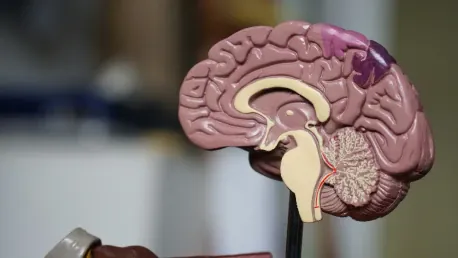Alzheimer’s disease, a devastating condition affecting millions, remains a formidable challenge for researchers and clinicians alike. Recent advancements in precision medicine offer a promising frontier in the battle against this neurodegenerative disorder. At the helm of this exciting development is Agustin Ruiz, MD, PhD, a prominent figure in Alzheimer’s genetics and biology, now leading a dedicated team at the Glenn Biggs Institute for Alzheimer’s and Neurodegenerative Diseases. This initiative marks a defining moment in the pursuit of more effective and individualized treatment strategies for Alzheimer’s patients.
Pioneering Precision with Proteomics
Revolutionary Technology in Place
Ruiz recently secured a $300,000 grant for the acquisition of NULISA™ technology, a groundbreaking tool that allows for the analysis of minute biological samples such as blood, tears, saliva, and cerebrospinal fluid. These samples, rich in proteins that act as messengers for our DNA, can reveal crucial insights into the pathogenesis of diseases when examined. Proteins that are improperly constructed or misfolded can lead to various conditions, including Alzheimer’s.
The John and Rita Alter President Chair in Alzheimer’s Research facilitated locating Ruiz to UT Health San Antonio, laying the groundwork for an intensified focus on precision medicine for Alzheimer’s disease. NULISA™ technology stands out because of its ability to perform highly sensitive proteomic analysis. This sophisticated approach enables researchers to detect and quantify protein expressions with unprecedented precision. Such capabilities are essential for identifying unique proteomic signatures, which are instrumental in developing targeted therapies. By understanding the specific protein alterations associated with different Alzheimer’s subtypes, Ruiz’s team can design and implement treatments tailored to the individual patient’s needs.
Advancing Proteomics for Individualized Treatment
Proteomics, the large-scale study of proteins, is a critical component in understanding Alzheimer’s on a molecular level. Proteins serve as the functional molecules within cells, orchestrating a wide range of biological processes. In the context of Alzheimer’s, specific changes in protein structures and functions can indicate the presence and progression of the disease. The detailed analysis of these changes through proteomics allows for the identification of biomarkers—biological indicators that can signal the onset of disease even before clinical symptoms manifest.
This advancement holds the promise of early diagnosis, a crucial factor in managing Alzheimer’s. By detecting the disease in its nascent stages, clinicians can initiate interventions aimed at slowing or halting its progression. Moreover, the precision afforded by this proteomic analysis means that treatments can be customized to address the unique protein alterations in each patient. This tailored approach contrasts sharply with the traditional one-size-fits-all treatments, offering hope for more effective and personalized therapeutic strategies.
The Future of Alzheimer’s Treatment
The Vision of Precision Medicine
Precision medicine, as defined by the FDA, aims to provide the right treatment to the right person at the right time. In Alzheimer’s research, this approach necessitates a deep understanding of the disease’s diverse manifestations. Alzheimer’s is not a single disease but rather a spectrum of conditions with varying genetic, molecular, and phenotypic differences. Recognizing these variations is fundamental to developing accurate prognoses and effective treatment regimens. The work at the Glenn Biggs Institute underscores this realization, focusing on identifying biomarkers for each Alzheimer’s subtype.
Ruiz and his team are poised to take significant strides in this domain over the next few years. The development of these biomarkers not only promises earlier detection but also equips healthcare professionals with the tools to tailor interventions to individual patients’ profiles. This personalized treatment plan could revolutionize the standard of care for Alzheimer’s disease, turning what was once a one-dimensional approach into a multifaceted strategy that addresses the complex nature of the disease.
The Impact on Global Medical Practice
UT Health San Antonio’s initiative is part of a broader collaboration, involving partnerships with various scientific institutes eager to leverage these groundbreaking discoveries to influence global medical practice. By focusing on the cutting-edge field of precision medicine, the aim is to create a ripple effect that extends beyond the local community. The advancements made in San Antonio can serve as a model for similar initiatives worldwide, reinforcing the importance of personalized medicine in treating complex diseases like Alzheimer’s.
The potential of this research to transform treatment extends beyond patient care. It also offers valuable insights that can be applied to other neurodegenerative diseases, paving the way for a new era in medical research and therapy. By setting a precedent in the application of precision medicine to Alzheimer’s, researchers hope to inspire innovations across various fields, ultimately improving the quality of life for countless individuals afflicted with debilitating conditions.
A New Era in Alzheimer’s Research
Alzheimer’s disease, a harrowing condition impacting millions globally, remains a significant hurdle for both researchers and clinicians. However, recent advancements in precision medicine are emerging as a beacon of hope in combating this debilitating neurodegenerative disorder. Leading this promising development is Dr. Agustin Ruiz, MD, PhD. A notable expert in Alzheimer’s genetics and biology, Dr. Ruiz now spearheads an insightful team at the Glenn Biggs Institute for Alzheimer’s and Neurodegenerative Diseases. This initiative symbolizes a milestone in the ongoing effort to develop more effective and tailored treatment approaches for those suffering from Alzheimer’s. The work being done by Dr. Ruiz and his team underscores a commitment to improving the lives of patients through innovative medical strategies that align with the principles of precision medicine. This focused approach not only enhances our understanding of the disease but also paves the way for targeted therapies that may alter the course of Alzheimer’s and improve outcomes significantly.









